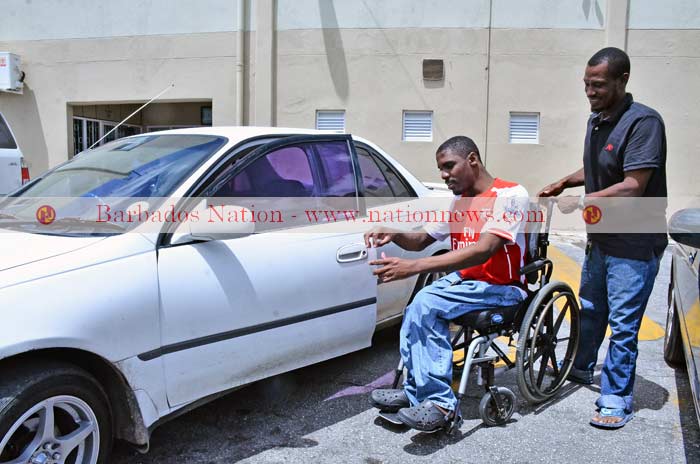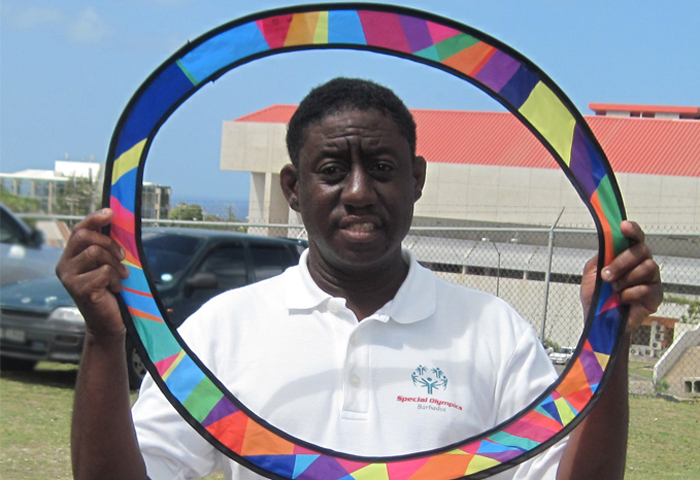MARCH IS DESIGNATED Month Of The Disabled in Barbados. This year the Barbados Council for the Disabled is hosting activities under the theme: Here Today, Here To Stay; Come, Get To Know Us! During the month the Monday Man column will feature members of the disabled community as they share their stories.
Today we focus on Joseph Murrell, a wheelchair user.
“NORMAL, WHAT IS NORMAL?” asked Joseph Murrell.
“Normal is a setting on a washing machine,” said the 29-year-old who has had to confront notions of “normal” all his life. “We need to get away from all of the terms that are used to label people.”
Though he has cerebral palsy and is a wheelchair user, Joseph insisted that his disability does not define who he is, neither does it quash his indomitable spirit. He is full of life and cheerful.
But it wasn’t always so.
“It was not an overnight thing,” he admitted. “There are going to be some days when you wake up and it is not all cheery. This morning I woke up and looked over at my wheelchair and told myself, that is a wheelchair and even though I see it every day it dawned on me that that is my chair. Sometimes you have to take that step back and remember where you are.”
When he was younger he did not always have this upbeat personality. Actually it took a while for him to accept that being disabled was going to be his life. He eventually determined that he would not allow his condition, which is marked by impaired muscle coordination, to hold him back.
Cerebral means “of the brain”. Palsy means “a complete or partial loss of the ability to move a body part”. So cerebral palsy means loss of ability to move a body part because of a problem with the brain.
Joseph’s spine was affected by his condition. “The signals from your brain to your feet that would tell you I want to stand without you even thinking too much about it, they don’t work for me,” Joseph explained.
Paralysed from the waist down, Joseph said his upper body functions quite well.
“When I was a toddler, my mother realised that I was not developing at the rate at which the average child my age was. She took me to the Children’s Development Centre; that is where we got the confirmation that something was not quite right.
“From there it was just a matter of accepting the challenge which I have and moving on from there,” Joseph said.
He was a student at the Children’s Development Centre before going to the Charles F. Broome special needs annex.
“At Charles F. Broome, they realised that apart from my disability, I was learning at a normal rate as the other children so they put me with the regular children,” he said.
That led to Joseph moving to the St George Primary School closer to his home at the Thelma Vaughan Memorial Home. He sat the common entrance exam and went to St Leonard’s Boys’ School and to the Barbados Community College (BCC) to pursue the associate degree in computer studies.
Joseph said the adaptation to mainstream schooling went very well for him. Luckily the students at his primary school were open and receiving and curious. “They wanted to know why I am in a wheelchair and once they got accustomed to me, I had some friends and we are still friends up until today.
“The children were always willing to help me go where I wanted to go. At primary school the girls used to fight to push my chair, that was so much fun,” he said with a chuckle. He added, “Then I went to an all-boys school and I was like, what happened here?”
Schooling was not without its challenges. At primary school the bathroom had to be retrofitted and a great uncle, a mason, dealt with that. At secondary school, when the others were at PE, “I would ask why I could not be out there”.
However, Joseph said he capitalised on that free time to get a one-up on his classmates by doing his homework, leaving the rest of his evening free. He would also place first in class.
For studies at BCC, a ramp was constructed to accommodate him. He completed his studies and is now employed at the Barbados Light and Power Company (BL&P).
Even though many members of the disabled community complain of lack of opportunities for employment, Joseph is fortunate enough to have been employed for the past seven years.
He said owners of businesses have to be willing to offer jobs but he said it had to be a two-way street. The disabled person who wants to be taken note of in society without a stigma attached but who wants to be seen as a “normal” person needs to be equipped with the necessary skill sets and qualifications.
“If you want to be interviewed for a job, on paper you should be qualified, that way the employer does not have the sole discretion on whether you get the job. The playing field is fairer that way,” Joseph said.
He did his job attachment at BL&P for his final grade at BCC and made an impression. “They were so happy with the level of work I did after the job attachment they called me back to continue working,” Joseph said.
Nonetheless, Joseph’s disability has impacted on his everyday life, particularly when it comes to transportation. His friend of 17 years, Corey Lashley, who started working at the Thelma Vaughan Home when Joseph resided there, has never lost contact and sometimes acts as Joseph’s personal chauffeur.
Corey said his friend’s positive outlook always has a similar effect on him and he is cheered up right away, whenever in Joseph’s presence. Fully accessible Barbados is not a reality, said Joseph, who avoids Bridgetown. Though he would love to be able to move around freely in the island’s capital, he sees that as a long way off. Sheraton Centre is his best bet for getting out or to the cinema at Limegrove.
Not only infrastructural changes are needed but people need to change attitudes, he said. “If they realise that (a disability) may not be something you are born with, but every and anyone can become disabled at any point in time they would become a society who has fostered a mindset of acceptance.” That really ought to be a “normal” way of thinking.
Article Compliments: Nation News




 Ever heard the saying “it’s better to give than to receive” well that also applies to time. By volunteering we support an organization or cause and make a great difference in our communities. It’s also a great way to meet new people and learn about the challenges they face daily. Consider giving more than just money, give your time !
Ever heard the saying “it’s better to give than to receive” well that also applies to time. By volunteering we support an organization or cause and make a great difference in our communities. It’s also a great way to meet new people and learn about the challenges they face daily. Consider giving more than just money, give your time !

